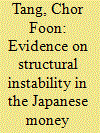|
|
|
Sort Order |
|
|
|
Items / Page
|
|
|
|
|
|
|
| Srl | Item |
| 1 |
ID:
105771


|
|
|
|
|
| Publication |
2011.
|
| Summary/Abstract |
The aim of this paper is to re-examine the relationship between electricity consumption, economic growth, and employment in Portugal using the cointegration and Granger causality frameworks. This study covers the sample period from 1971 to 2009. We examine the presence of a long-run equilibrium relationship using the bounds testing approach to cointegration within the Unrestricted Error-Correction Model (UECM). Moreover, we examine the direction of causality between electricity consumption, economic growth, and employment in Portugal using the Granger causality test within the Vector Error-Correction Model (VECM). As a summary of the empirical findings, we find that electricity consumption, economic growth, and employment in Portugal are cointegrated and there is bi-directional Granger causality between the three variables in the long-run. With the exception of the Granger causality between electricity consumption and economic growth, the rest of the variables are also bi-directional Granger causality in the short-run. Furthermore, we find that there is unidirectional Granger causality running from economic growth to electricity consumption, but no evidence of reversal causality.
|
|
|
|
|
|
|
|
|
|
|
|
|
|
|
|
| 2 |
ID:
122457


|
|
|
|
|
| Publication |
2013.
|
| Summary/Abstract |
The main purpose of this study is to re-investigate the long-run Japanese M2 money demand function and its stability over the period of 1970:Q1 to 2010:Q4. This study uses the bounds testing approach to cointegration within the autoregressive distributed lag (ARDL) framework to examine the presence of a cointegration relationship. The rolling regression procedure is then incorporated into the ARDL cointegration test to investigate the stability of the cointegrating relationship between money demand and its determinants in Japan. With the full sample, this study confirms that real M2 money demand, real income, real interest rates and real exchange rates are cointegrated. However, the evidence of the rolling ARDL cointegration test implies that the cointegrating relationships are not stable over time, indicating that the Japanese M2 money demand function is also unstable. In line with the rolling ARDL cointegration results, the recursive Chow breakpoint F-test and the Quandt likelihood ratio (QLR) test also suggest the same instability outcome.
|
|
|
|
|
|
|
|
|
|
|
|
|
|
|
|
| 3 |
ID:
136554


|
|
|
|
|
| Summary/Abstract |
The purpose of this study is to empirically investigate the vindication of the savings-led growth hypothesis for the Malaysian economy with the long-run TYDL version of the Granger causality test—Toda and Yamamoto (1995) and Dolado and Lütkepohl (1996). This study used the quarterly sample from 1970:Q1 to 2008:Q4. The recursive regression procedure will also incorporate into the TYDL causality test to measure the stability of the savings-led growth hypothesis in the long-run. Our empirical results support that the savings-led growth hypothesis is a long-run phenomenon and stable over time. Therefore, the Malaysian dataset supports the endogenous growth theory.
JEL Classification: C22, E21, O16
|
|
|
|
|
|
|
|
|
|
|
|
|
|
|
|
| 4 |
ID:
133224


|
|
|
|
|
| Publication |
2014.
|
| Summary/Abstract |
Using panel data of 24 countries in the Middle East and North African (MENA) region from 2001 to 2009, the purpose of this study is to examine the impacts of tourism, energy consumption and political instability on economic growth within the neoclassical growth framework. To address the objective of this study, we utilise both the static panel data approach as well as the dynamic generalised method of moments (GMM) estimator to examine the impact of candidate variables. Our results show that energy consumption and tourism significantly contribute to the economic growth of countries in the MENA region. Hence, our study lends some support to the existence of the tourism-led growth and energy-led growth hypotheses in the region. In line with our expectation, our estimation results also reveal that political instability impedes the process of economic growth and development in the MENA region. Therefore, macroeconomic policies to promote expansion in tourism and energy consumption will directly stimulate economic growth. Additionally, efforts to help the region overcome its history of political instability would attract more international tourist arrivals and further invigorate economic growth.
|
|
|
|
|
|
|
|
|
|
|
|
|
|
|
|
| 5 |
ID:
124685


|
|
|
|
|
| Publication |
2013.
|
| Summary/Abstract |
This study investigated the validity of the pollution haven hypothesis in the Gulf Cooperation Council (GCC) countries using a multivariate framework. To achieve the goal of this study, the non-stationary panel techniques were used to examine the hypothesis from 1980 to 2009. Based on the Pedroni cointegration test results, it was found that the variables are cointegrated. Moreover, the Fully Modified OLS results showed that energy consumption and GDP growth increase CO2 emission while foreign direct investment inflows have a long run negative relationship with CO2 emission. Furthermore, based on the short run Granger causality test results, FDI has no short run causal relationship with CO2 emission and energy consumption while energy consumption and GDP growth have a positive causal relationship with CO2 emission. Thus, the results of this study indicate that energy consumption and GDP growth are the source of pollution in the GCC countries and not the foreign direct investment inflows. Thus, the study recommended that these countries should utilize policies to encourage inward foreign investment since it plays an important role in stimulating GDP growth.
|
|
|
|
|
|
|
|
|
|
|
|
|
|
|
|
| 6 |
ID:
117639


|
|
|
|
|
| Publication |
2012.
|
| Summary/Abstract |
The savings-growth nexus is an age-old empirical problem, but the causal relationship between savings and economic growth remains controversial. Establishing a clear causal relationship has signifi cant policymaking implications for economic growth and development. Therefore, the purpose of this study is to re-visit empirically the savings-growth nexus for the fi ve ASEAN founding economies-ASEAN-5-via a multivariate framework. This study covered the annual data from 1970 to 2010. The Bartlett-corrected trace test for cointegration was adopted to examine the presence of a long-run relationship between savings and its determinants. The estimation results suggest that savings and its determinants are cointegrated in the fi ve ASEAN founding countries. urthermore, the bootstrapping approach was used to ascertain the causality direction between savings and economic growth. We found that savings Granger cause economic growth in all ASEAN-5 economies. Therefore, we believe that savings is a prominent source of economic
|
|
|
|
|
|
|
|
|
|
|
|
|
|
|
|
| 7 |
ID:
125866


|
|
|
|
|
| Publication |
2013.
|
| Summary/Abstract |
In the previous decades, a number of studies have been conducted to analyse the causal relationship between electricity consumption and economic growth in the Portuguese economy. However, the evidence remains controversial because the previous studies do not provide clear causality evidence. This might be attributed to the omitted variables bias because most previous studies only focus on the relationship between electricity consumption and economic growth in a bi-variate model. This paper attempts to re-investigate the relationship between electricity consumption and economic growth in Portugal using a multivariate model. Based on the bounds testing approach to cointegration and the Granger causality test within the vector error-correction model (VECM), our empirical results confirm the presence of cointegration among the variables. Moreover, there is evidence of bi-directional causality between electricity consumption and economic growth in the short- and long-run. This suggests that energy is an important source of economic growth in Portugal. Therefore, energy conservation policies should not be implemented because it would deteriorate the process of economic growth and development of the Portuguese economy.
|
|
|
|
|
|
|
|
|
|
|
|
|
|
|
|
| 8 |
ID:
124713


|
|
|
|
|
| Publication |
2013.
|
| Summary/Abstract |
This study uses the annual data from 1972 to 2010 to assess the causal relationship between electricity consumption and real output at the aggregate and sectoral levels in Pakistan. This study covers three main economic sectors in Pakistan namely agricultural, manufacturing and services sectors. Our cointegration results reveal that the variables are cointegrated at the aggregate and sectoral levels. At the aggregate level, we find that there is uni-directional Granger causality running from electricity consumption to real output in Pakistan. At the sectoral level, we find that electricity consumption Granger-causes real output in the manufacturing and services sectors. However, there is no causal relationship between electricity consumption and real output in the agricultural sector. The policy implication of these results is that electricity conservation policies in general would deteriorate the process of economic growth as well as the real output in the manufacturing and services sectors in Pakistan. Nevertheless, we suggest the Pakistani government to implement the electricity conservation policies merely to the agricultural sector because such policies may have less or no adverse impact on its real output.
|
|
|
|
|
|
|
|
|
|
|
|
|
|
|
|
| 9 |
ID:
080437


|
|
|
|
|
| Publication |
2007.
|
| Summary/Abstract |
This paper employs the modified Wald (MWALD) causality test to re-examine the relationship between crime and its determinants (inflation and unemployment) in the United States from 1960 to 2005. Bounds test approach is employed to investigate the existence of a long-run relationship. The empirical evidence suggests that inflation and crime rates are cointegrated with a positive relationship. Moreover, the causal link is from inflation and unemployment to crime
|
|
|
|
|
|
|
|
|
|
|
|
|
|
|
|
|
|
|
|
|